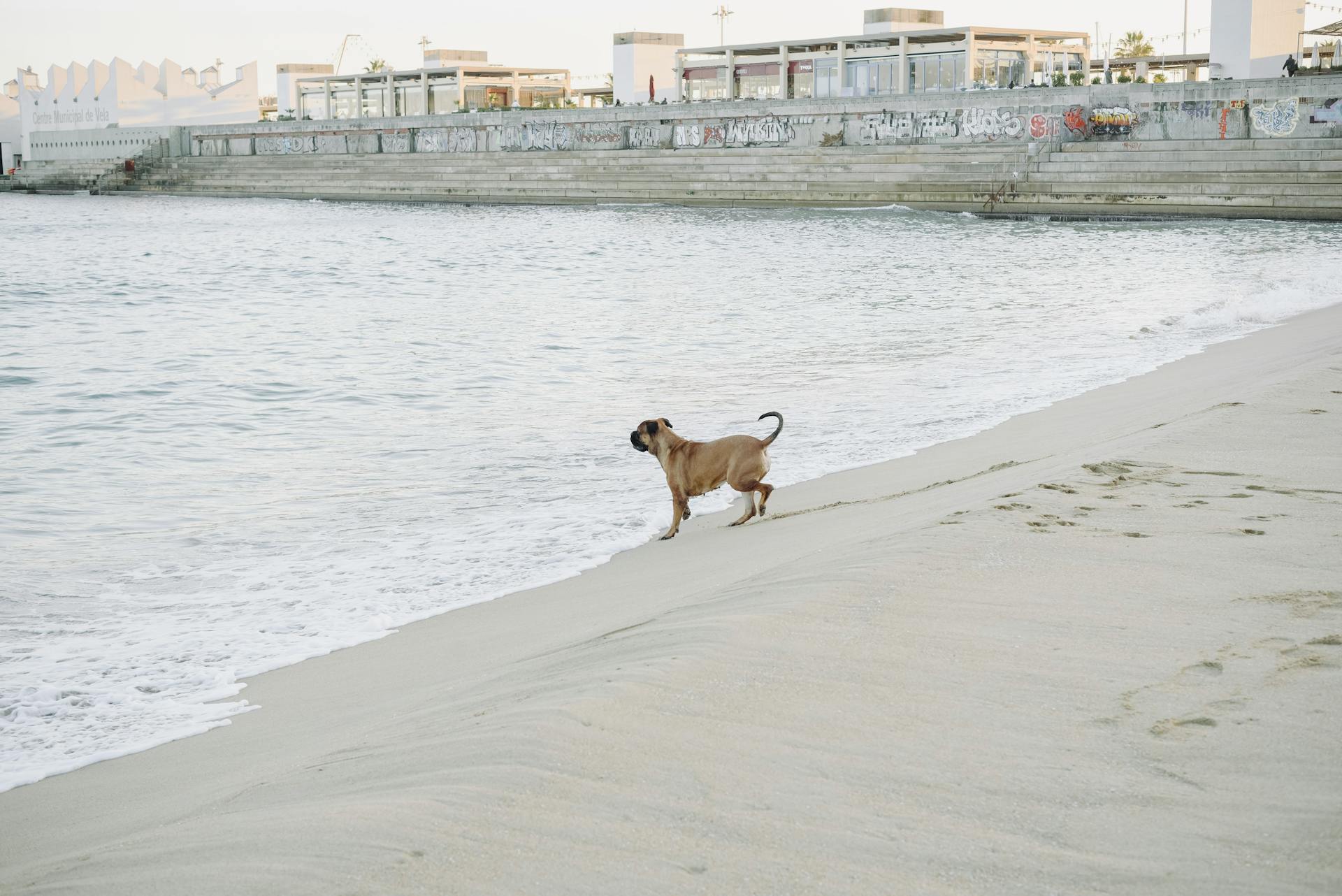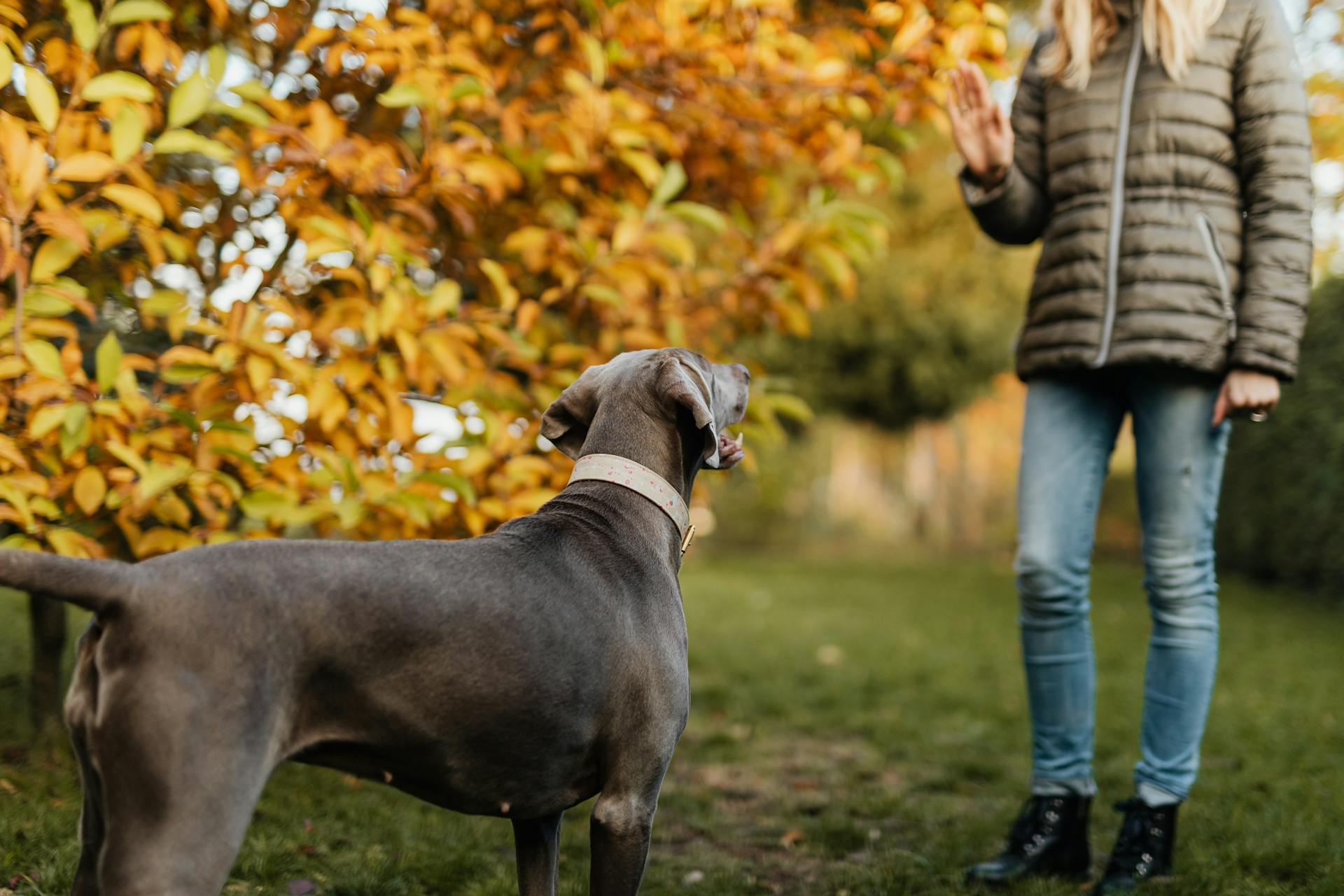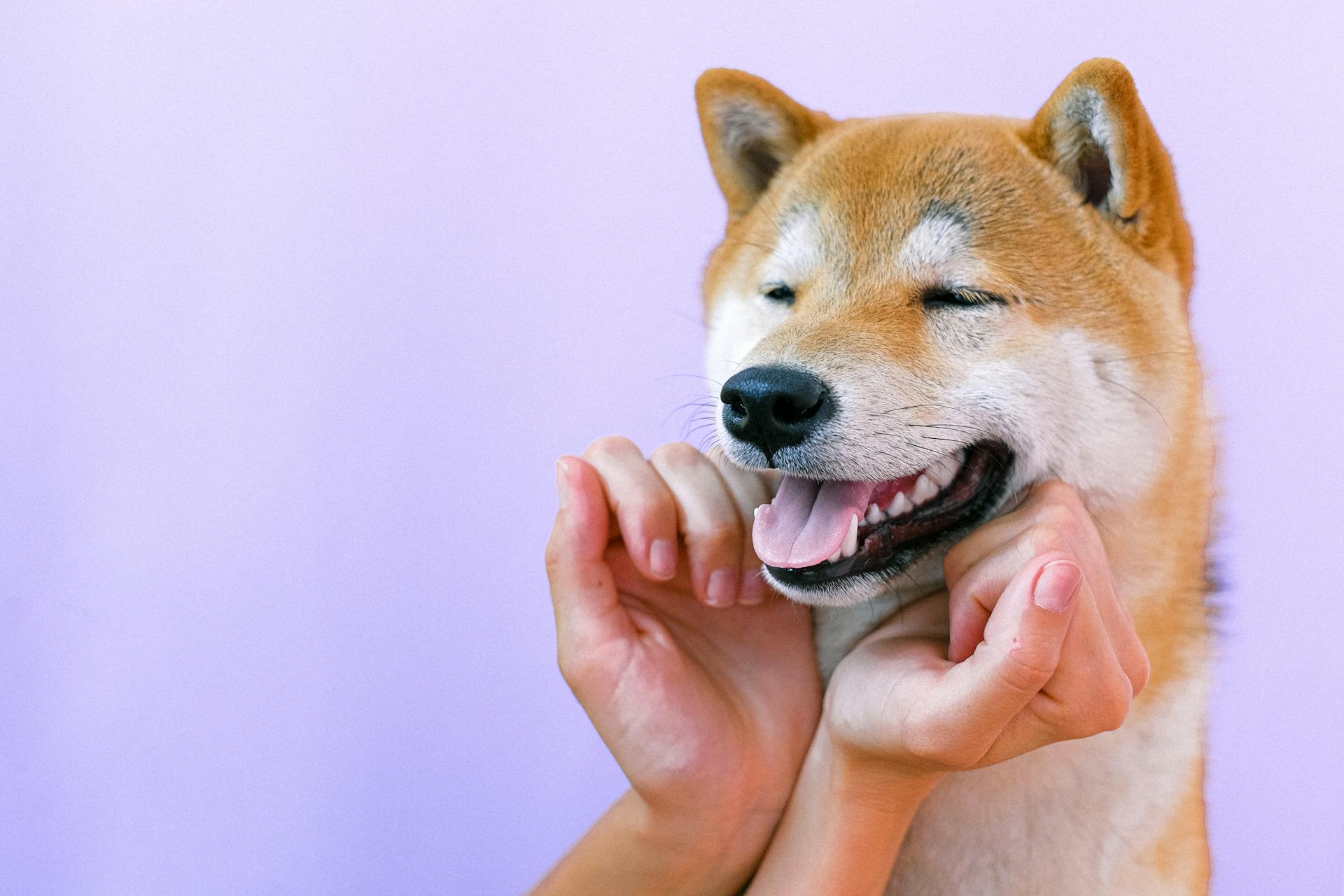
Living with a Shiba Inu can be a unique experience, but one thing is for sure - they are loyal companions. Shiba Inus are known to form strong bonds with their owners, often becoming Velcro dogs that stick by their side.
Shiba Inus are natural-born explorers and love to investigate their surroundings. They have a strong prey drive and may not be the best fit for homes with small pets, especially rabbits or guinea pigs.
Shiba Inus are highly intelligent dogs that thrive on mental and physical stimulation. They require regular exercise, such as daily walks and playtime, to keep them happy and healthy.
Physical Characteristics
The Shiba Inu's physical characteristics are quite striking. They have a medium-sized body with a compact frame and well-developed muscles.
One of the distinctive features of the Shiba Inu is their fox-like appearance, which is accentuated by their pointy ears and dark eyes. Their weight can range from 17 pounds for females to 23 pounds for males.
Their thick coat comes in several colors, including cream, black and tan, red, and red sesame. They also have white markings on their chest, belly, cheeks, legs, and inner ears.
The Shiba Inu's coat is double-layered, with a stiff and straight outer coat and a soft and thick undercoat. Guard hairs stand off the body and are about 1.5 to 2 inches long at the withers, helping to protect their skin and repel rain or snow.
Their tail hair is slightly longer and stands open in a brush, making their tails a defining characteristic of the breed. The cream color is considered a "major fault" by some kennel clubs, as it can make the required markings called "urajiro" (underside white) invisible.
Here are the required areas for urajiro markings on all coat colors:
- On the sides of the muzzle
- On the cheeks
- Inside the ears
- On the underjaw and upper throat
- Inside the legs
- On the abdomen
- Around the vent
- The ventral side of the tail
Shiba Temperament
The Shiba Inu is a confident dog, known for their alert and loyal nature.
They tend to form strong bonds with their owners, but can also be quite independent and territorial.
Inquisitive and playful, Shibas love being involved in everything around the home and will be a loyal and loving companion to any owner.
However, they can be stubborn and strong-willed, requiring a lot of exercise and stimulation to prevent anxiety and undesirable behaviors.
A survey of experts classified the Shiba Inu as having 'high aggression, high reactivity and medium trainability', which may be due to their close relation to wolves.
The Shiba Inu can be quite vocal, with a tendency to yodel when they want attention and make a high-pitched scream when they become excited.
Here are some key characteristics of the Shiba Inu temperament:
- Confident and bold
- Good-natured, but can be slightly stubborn
- Independent and territorial
- Strong prey drive and hunting instinct
- Can be vocal, with a tendency to yodel or scream
Shiba Inus are not the best choice for first-time owners or families with young children, as they can be impatient and require proper training and socialization.
However, with the right owner and training, they can make great companions and loyal friends.
See what others are reading: Medical Dog Training
History and Origins
The Shiba Inu has a rich and fascinating history that dates back to the prehistoric Jōmon period of Japanese history, where dogs with a similar appearance to the Shiba Inu were represented in dogū.
Suggestion: Shiba Inu All Time High Market Cap
The breed was originally bred to hunt and flush small game, such as birds and rabbits, in the mountainous areas of the Chūbu region.
Shiba Inus were once nearly extinct due to wartime food shortages and outbreaks of distemper in the 1950s and 60s, but thanks to the efforts of hunters and intellectuals, the breed was preserved.
The Shiba Inu was formally recognized as a breed in Japan in 1934, with the publication of the Nippo Standard, and was later recognized as a Natural Monument of Japan in 1936.
The breed was brought to the United States in 1954, where it was first bred in 1979, and was recognized by the American Kennel Club in 1992.
Today, the Shiba Inu is the number one companion dog in Japan, and is primarily kept as a pet both in Japan and abroad.
For more insights, see: Akitas in Japan
Care and Maintenance
Shiba Inus are a high-maintenance breed when it comes to their grooming needs. They have a thick, double coat that sheds heavily, especially during molting season, and require regular brushing to keep their coat tangle-free and healthy.
For your interest: Shiba Inu Coat
To prevent matting and tangling, brush your Shiba Inu at least once a week, paying extra attention to areas where the coat is longest. Their coats come in four recognized colors: red, white, sesame, and black and tan.
Shibas are also prone to shedding year-round, but more heavily in the spring and autumn. Regular brushing can help reduce the amount of hair around the house and keep their coat in good condition.
Lifespan
The lifespan of a Shiba Inu is a remarkable aspect of their care and maintenance. A review of cemetery data in Japan found that the breed has a life expectancy of 15 and a half years.
This is significantly greater than many other breeds, making it a wonderful companion for many years to come. A 2024 UK study found a life expectancy of 14.6 years for the breed.
This means that with proper care, your Shiba Inu can live a long and healthy life, bringing joy and companionship to your family for many years.
Broaden your view: Shiba Inu Life Stages
Care Tips
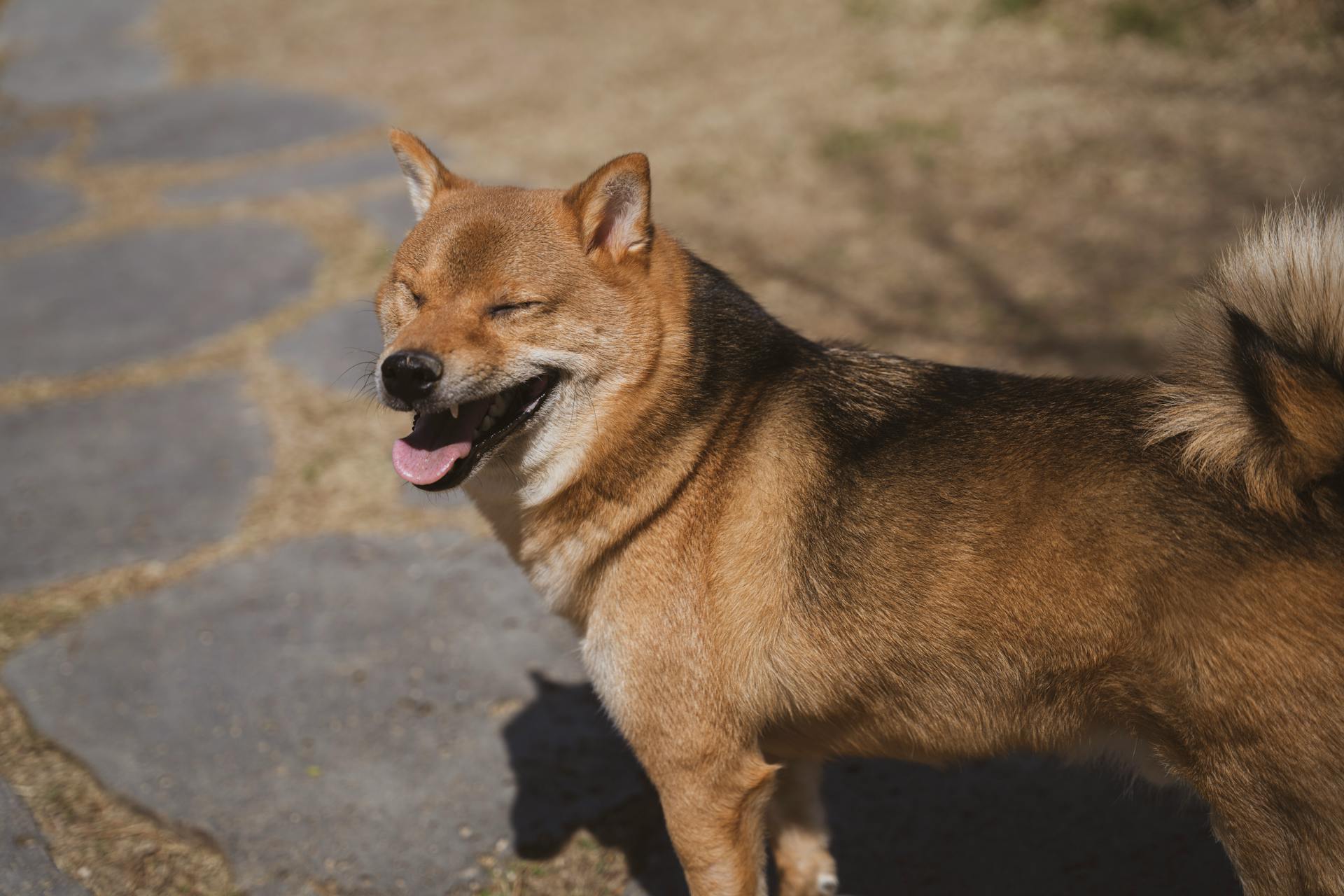
Shiba Inus have a thick, high shedding coat that requires regular attention. They need weekly brushing to keep their coat tangle free and healthy, especially with their thick, double coat consisting of a soft, dense undercoat covered by a harder, straight topcoat.
Their coats come in four recognised colours: red, white, sesame, and black and tan. Be prepared for lots of hair around the home, as Shibas are a heavy shedding, non-hypoallergenic breed.
Regular brushing is needed to remove dead hair, especially during the spring and autumn when they tend to shed more heavily. You can also expect to see a lot of hair around the house year-round.
To keep your Shiba clean and healthy, establish a consistent oral hygiene routine to prevent tooth or gum issues. Regularly check their ears for any build up of wax that could lead to infection.
If your Shiba isn't used to bathing or grooming, they might let out their infamous, high-pitched scream. To avoid this, expose them to these activities at a young age, and perform regular nail trims, brushing, bathing, and grooming.
For more insights, see: Shiba Inu Haircut
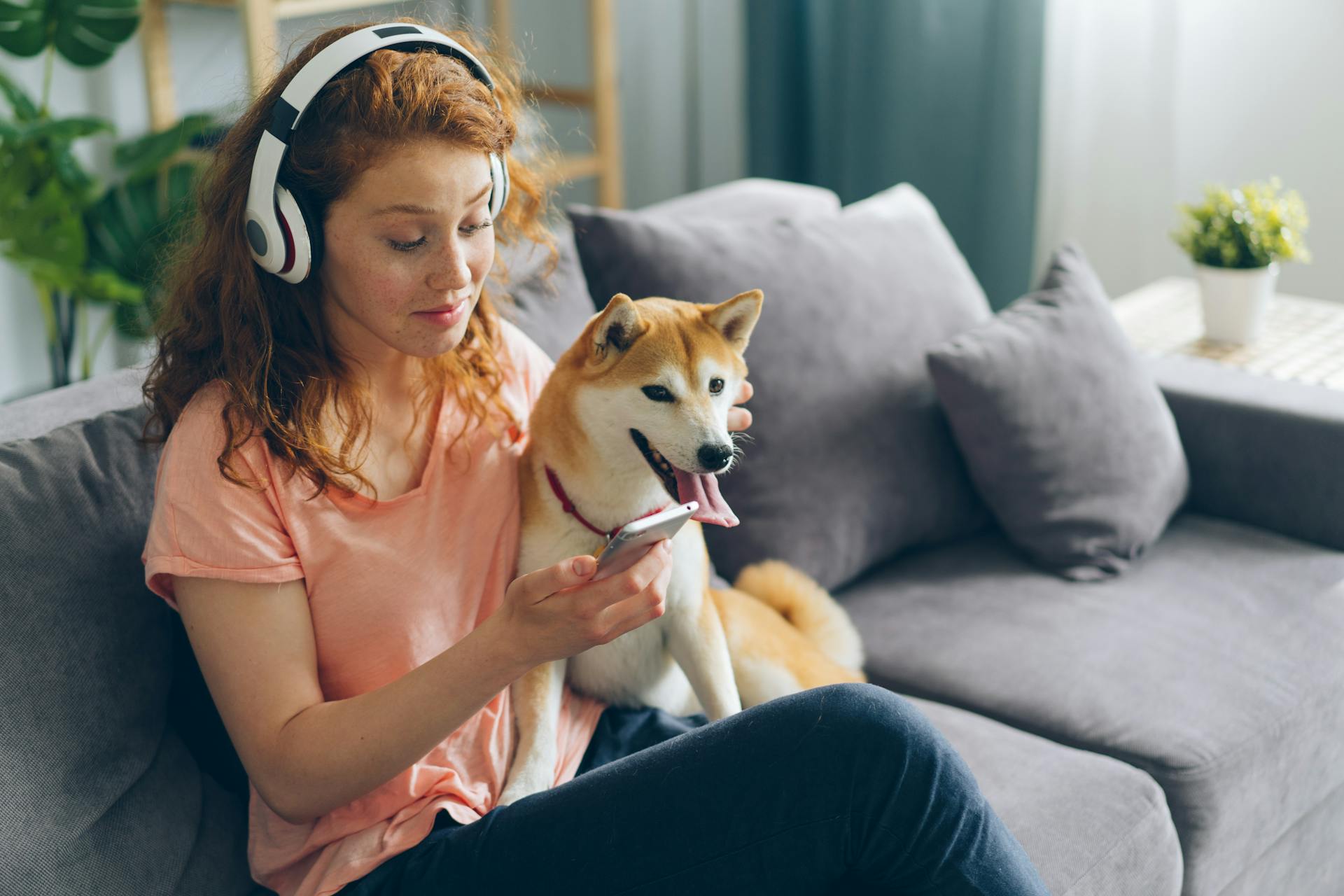
Here are some grooming tips to keep in mind:
- Brush your Shiba weekly to keep their coat tangle free and healthy.
- Consider taking your Shiba to a professional groomer if they're not used to grooming.
- Regularly expose your Shiba to grooming activities at a young age to make them more pleasant for both you and your dog.
Shibas appreciate routine and obedience training from a young age. Establishing a schedule will ensure your Shiba is a respectful, healthy member of your family.
Diet and Nutrition
Your Shiba Inu's nutrition plan should be tailored to their small but active nature, helping them maintain a healthy weight.
Shibas are known to be very food motivated, so it's essential to choose good quality food in the right sized portions to avoid overfeeding.
A balanced diet of good quality, dry dog food with all the necessary minerals and proteins will help your Shiba thrive.
To determine the right amount of food for your Shiba, consider their energy levels and size, aiming for about one to one and a half cups of kibble per day.
Free feeding should be avoided, as some Shibas will eat anything in sight, leading to potential weight issues.
A healthy Shiba should have a compact body shape, with a backbone, hip bones, and ribs that can be felt but not seen.
If you're unsure about your Shiba's diet, consult with your veterinarian, who can assess their ideal weight and help you create a personalized diet plan.
If this caught your attention, see: A Guide to Managing Healthy Weight in Your Dog This Summer
Training and Socialization
Training a Shiba Inu requires patience, consistency, and positive reinforcement, as they can be stubborn and independent.
Their intelligent nature makes them relatively easy to train, but their strong-willed nature means they may lose focus and test boundaries.
Shiba Inus need plenty of mental stimulation to avoid boredom, which can lead to destructive behavior if they don't receive enough exercise and mental activity.
To keep them engaged, try hiding food treats around the garden for them to find, or play ball games that challenge their problem-solving skills.
Early training and socialization are crucial for teaching good manners, and it's essential to start training as soon as possible.
Here are some essential training tips:
- Recall training is a must, as Shiba Inus have a strong hunting instinct and may chase anything that moves.
- Provide plenty of off-lead exercise in a safe, enclosed area, but be careful not to let them escape.
- Housebreaking is relatively easy, and many Shiba puppies can wait until morning to go outside by five weeks old.
Training and Exercise
Training and exercise are crucial for Shiba Inus to maintain a healthy weight and satisfy their energetic personalities. A Shiba will need between 40 and 60 minutes of exercise every day.
Shiba Inus are highly intelligent, but their strong-willed nature means training can be a challenge. They tend to lose focus and test boundaries, making recall training essential.
Consider reading: Training a Dog to Protect
To avoid boredom and destructive behavior, Shibas need plenty of mental stimulation. This can be achieved through toys, games, and activities that challenge their minds.
Shiba Inus love problem-solving games and will enjoy hunting for food treats. Hiding treats around the garden or using a ball game can help improve recall training and keep them engaged.
In the summer months, a garden water hose can be a great source of fun for Shibas. They'll enjoy trying to catch the water, which will also help cool them down.
It's essential to provide regular physical activity, especially if your Shiba doesn't have a securely fenced yard. This can include walks, runs, or playtime in a safely enclosed area.
Here's a rough guide to the exercise needs of Shiba Inus:
Remember, every Shiba is different, and exercise needs may vary depending on individual circumstances.
Getting a Dog
First and foremost, you'll need to decide whether to adopt or buy a dog, and for Shiba Inus, the National Shiba Club of America is a great resource to start your research.
If you're interested in adopting, consider reaching out to rescue organizations like the NYC Shiba Rescue.
Adopting from a rescue organization can be a rewarding experience, and it's a great way to give a loving home to a dog in need.
You could also consider breeds similar to Shiba Inus, such as Akitas, Chow Chows, and Japanese Spitz, which have similar characteristics and needs.
Take a look at this: Dog Similar to Akita
Before Buying or Rehoming a Pet
Before buying or rehoming a Shiba Inu, it's essential to consider their unique needs and personality traits. Shibas are loyal and loving, but also notoriously independent and stubborn, making them best suited for experienced owners and families with older children.
To ensure you're prepared for their needs, it's crucial to establish an alpha role early in your relationship and make sure your home is fully secure, especially if you have a garden. Shibas are expert escape artists who will test your boundaries.
Related reading: Shiba Inu Exercise Needs
A Shiba Inu requires between 40-60 minutes of exercise each day, with plenty of opportunities for mental stimulation to avoid boredom. Regular grooming is also a must, as they have a thick, double coat that sheds throughout the year.
Before choosing a breeder, be fussy and always opt for a reputable one. Under 'Lucy's Law', new puppies must be bought directly from a breeder or adopted from rescue, and third-party sellers are illegal.
Here are some key things to consider before welcoming a Shiba Inu into your home:
- Experienced owners and families with older children are best suited for Shibas.
- Shibas require 40-60 minutes of exercise each day.
- Regular grooming is necessary due to their thick, double coat.
- Choose a reputable breeder who adheres to 'Lucy's Law'.
My Life
As a dog owner, I can attest that Shiba Inus are incredibly loyal companions. They form strong bonds with their human family members.
One of the most striking things about Shiba Inus is their unique appearance. Their fox-like features, including their triangular ears and curved tails, make them look like they're straight out of a cartoon. Their thick double coats come in a variety of colors, including red, black, and sesame.
Shiba Inus are known for their independent nature, which can sometimes make them seem aloof. But with patience and consistency, you can build a strong relationship with your Shiba Inu. They thrive on routine and clear boundaries.
In terms of size, Shiba Inus are relatively small dogs, typically weighing between 15 and 25 pounds. This makes them a great choice for city dwellers or those with limited space. Despite their small size, they're still energetic dogs that require regular exercise to stay happy and healthy.
For more insights, see: Shiba Inu Size Comparison to Human
Frequently Asked Questions
Do shibas bond to one person?
Yes, Shibas form a strong, unique bond with one person, requiring trust and affection to develop. This devoted bond is a hallmark of the breed, making them loyal companions.
Do shibas like humans?
Yes, Shibas are loyal and loving companions that form a strong bond with their owners. However, their independent nature can sometimes make them stubborn and challenging to manage.
Sources
- https://www.timeout.com/tokyo/things-to-do/things-you-didnt-know-about-shiba-inu-japans-native-dog-breed
- https://en.wikipedia.org/wiki/Shiba_Inu
- https://www.petplan.co.uk/pet-information/dog/breed/shiba-inu/
- https://organicheadshots.com/blog/my-life-with-a-shiba-inu
- https://www.pawlicy.com/blog/shiba-inu-dog-breed/
Featured Images: pexels.com

